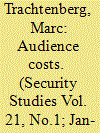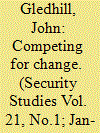|
|
|
Sort Order |
|
|
|
Items / Page
|
|
|
|
|
|
|
| Srl | Item |
| 1 |
ID:
111585


|
|
|
|
|
| Publication |
2012.
|
| Summary/Abstract |
This article examines the argument that the ability of a government to generate "audience costs"-to create a situation, that is, in which it would pay a domestic political price for backing down-plays a key role in determining how international crises run their course. It does this by looking at a dozen great power crises to see how well various aspects of the audience costs argument hold up in the light of the historical evidence. The audience costs mechanism, it turns out, does not play a major role in any of those crises-a conclusion which, the author claims, has certain important methodological implications.
|
|
|
|
|
|
|
|
|
|
|
|
|
|
|
|
| 2 |
ID:
111586


|
|
|
|
|
| Publication |
2012.
|
| Summary/Abstract |
When collective violence breaks out during periods of regime change, the root cause of that violence is ordinarily assumed to be a failure of state and/or governmental organizations, alongside transition. However, there are limits to the applicability of this understanding, since violence sometimes erupts during regime change, even when state and executive organs remain intact. This paper addresses those puzzling cases, by arguing that transitional violence can be a by-product of competition between, or within, a state's security services-for power and resources in an emerging regime. Competition develops where there is intense uncertainty about the form that the new regime might take and associated uncertainty about the distribution of power and state funds among state security services within that regime. The dynamics of transitional violence through intrastate competition are illustrated in the paper through treatment of two "most different" cases: Indonesia (1998) and Romania (1990).
|
|
|
|
|
|
|
|
|
|
|
|
|
|
|
|
| 3 |
ID:
111588


|
|
|
|
|
| Publication |
2012.
|
| Summary/Abstract |
The ability of nations to innovate technologically plays an important causal role in both security studies and international political economy. Explanations for national differences in technological capabilities, however, have had little place in international relations theory. This gap is partly the result of assumptions made by scholars that the rate and direction of technological change are determined by a state's domestic institutions and policies. This article will bring together recent findings about the political economy of technological innovation in order to show that much of this conventional wisdom is incorrect. Instead, it will be shown that, due to the distributive nature of technological change, different combinations of domestic tensions and external security concerns motivate elites to pursue or eschew a technologically competitive economy. Institutions are not causal, they are merely instrumental. Recent findings in the economic development literature therefore have important implications for security studies.
|
|
|
|
|
|
|
|
|
|
|
|
|
|
|
|
| 4 |
ID:
111587


|
|
|
|
|
| Publication |
2012.
|
| Summary/Abstract |
This paper assesses the relative importance of force employment as a cause of military victory. It focuses on the adoption of the modern system in interstate wars since 1917. Using cases, contingency tables, and regression analysis, we find that war participants who use the modern system are significantly more likely to succeed in decisive battlefield engagements. However, the modern system does not predict victory at a higher rate than more traditional unit-level explanations for combat effectiveness, suggesting that it might function as a causal mechanism linking factors like regime type and material endowments with martial capabilities. Exploring the possible links between unit-level explanations of military power and the organizational-level force employment indicators, we find that more materially powerful states and democracies tend to implement the modern system at a higher rate than other types of actors, but more extreme autocracies also frequently adopt. Combined, these findings suggest the relevance of continuing to explore how organizational-level variables impact military effectiveness.
|
|
|
|
|
|
|
|
|
|
|
|
|
|
|
|
|
|
|
|
|